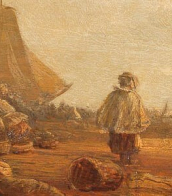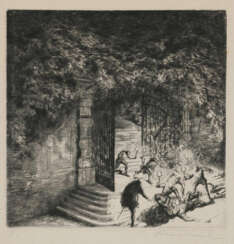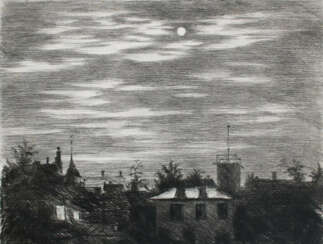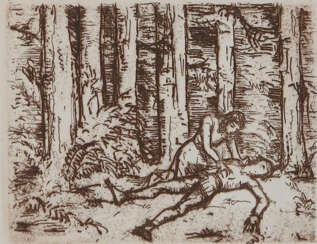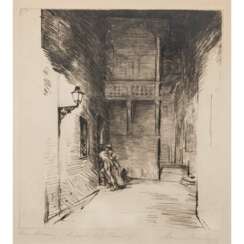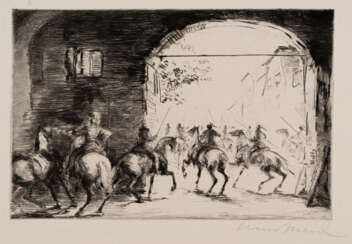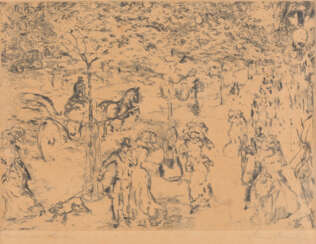Hans Meid (1883 - 1957) — Auction price
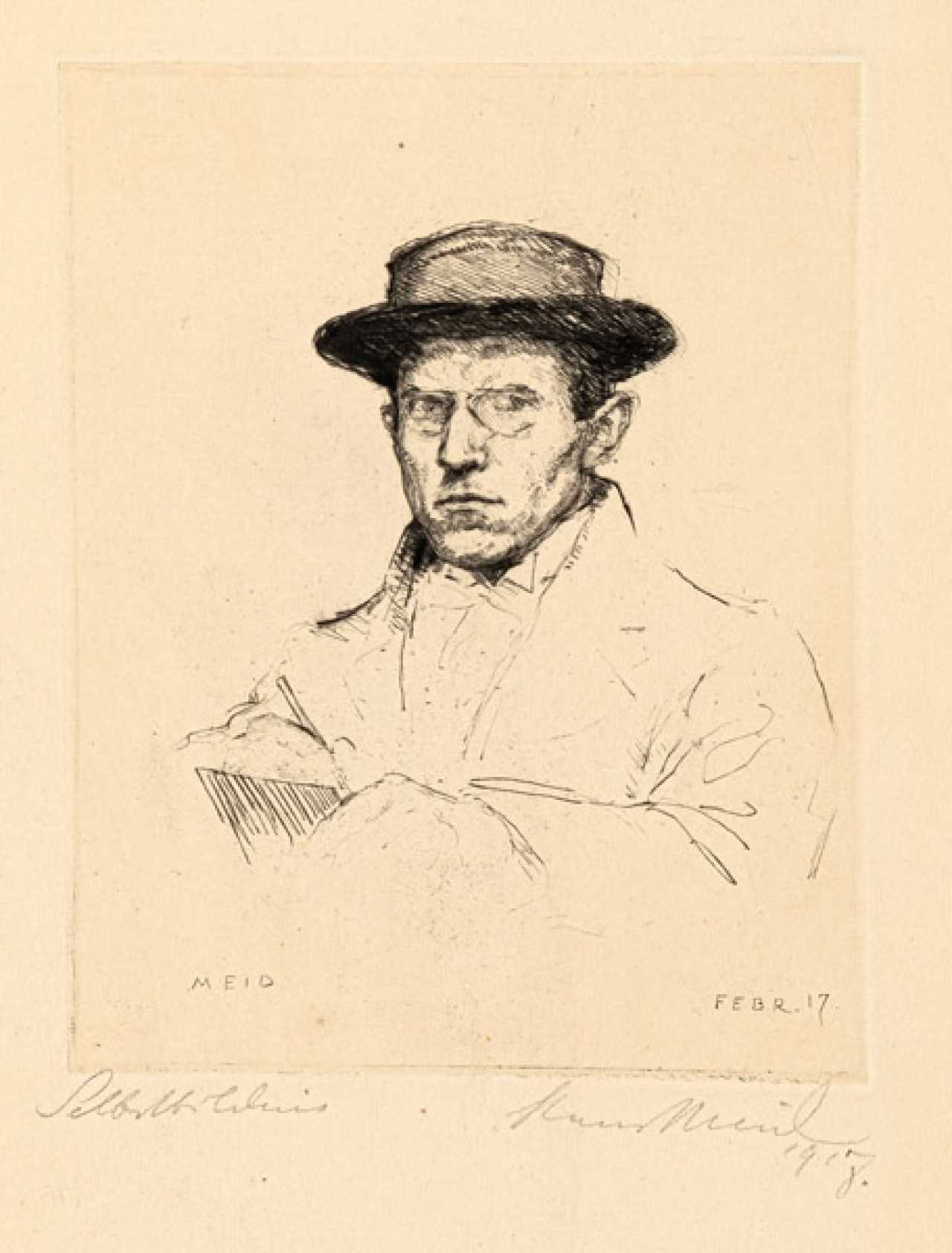
Hans Meid was a German painter, graphic artist and illustrator.
Meid attended an art and craft school in Karlsruhe, and then at the art academy he became a pupil of impressionist Wilhelm Trübner (1851-1917) and realist Walter Kontz (1872-1947). In 1907 the Meissen porcelain manufactory engaged him as a designer; in 1908 he settled in Berlin as a freelance artist. His success was recognized with the Villa Romana Prize (1910) and membership in the Berlin Secession (1911). In 1919 Meid became a lecturer in printmaking at the University of Fine Arts in Berlin. In 1927 he was elected a full member of the Prussian Academy of Fine Arts, where he also headed the graphic arts workshop.
In the first decades of the twentieth century Hans Meid, together with his close friend Max Slevogt, was one of the leaders of Impressionism. He created an extensive collection of etchings, lithographs and engravings, a large number of illustrations for works of world literature, including Cervantes' Don Quixote, Goethe's Selective Affinity and many others. He designed book covers for 44 publishers (notably Schünemann and S. Fischer). He later added ink drawing, watercolor and oil painting. In 1948 Hans Meid became a lecturer at the State Academy of Fine Arts in Stuttgart, he was also a member of the German Artists' Association.
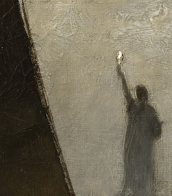

Hans Meid was a German painter, graphic artist and illustrator.
Meid attended an art and craft school in Karlsruhe, and then at the art academy he became a pupil of impressionist Wilhelm Trübner (1851-1917) and realist Walter Kontz (1872-1947). In 1907 the Meissen porcelain manufactory engaged him as a designer; in 1908 he settled in Berlin as a freelance artist. His success was recognized with the Villa Romana Prize (1910) and membership in the Berlin Secession (1911). In 1919 Meid became a lecturer in printmaking at the University of Fine Arts in Berlin. In 1927 he was elected a full member of the Prussian Academy of Fine Arts, where he also headed the graphic arts workshop.
In the first decades of the twentieth century Hans Meid, together with his close friend Max Slevogt, was one of the leaders of Impressionism. He created an extensive collection of etchings, lithographs and engravings, a large number of illustrations for works of world literature, including Cervantes' Don Quixote, Goethe's Selective Affinity and many others. He designed book covers for 44 publishers (notably Schünemann and S. Fischer). He later added ink drawing, watercolor and oil painting. In 1948 Hans Meid became a lecturer at the State Academy of Fine Arts in Stuttgart, he was also a member of the German Artists' Association.


Hans Meid was a German painter, graphic artist and illustrator.
Meid attended an art and craft school in Karlsruhe, and then at the art academy he became a pupil of impressionist Wilhelm Trübner (1851-1917) and realist Walter Kontz (1872-1947). In 1907 the Meissen porcelain manufactory engaged him as a designer; in 1908 he settled in Berlin as a freelance artist. His success was recognized with the Villa Romana Prize (1910) and membership in the Berlin Secession (1911). In 1919 Meid became a lecturer in printmaking at the University of Fine Arts in Berlin. In 1927 he was elected a full member of the Prussian Academy of Fine Arts, where he also headed the graphic arts workshop.
In the first decades of the twentieth century Hans Meid, together with his close friend Max Slevogt, was one of the leaders of Impressionism. He created an extensive collection of etchings, lithographs and engravings, a large number of illustrations for works of world literature, including Cervantes' Don Quixote, Goethe's Selective Affinity and many others. He designed book covers for 44 publishers (notably Schünemann and S. Fischer). He later added ink drawing, watercolor and oil painting. In 1948 Hans Meid became a lecturer at the State Academy of Fine Arts in Stuttgart, he was also a member of the German Artists' Association.


Hans Meid was a German painter, graphic artist and illustrator.
Meid attended an art and craft school in Karlsruhe, and then at the art academy he became a pupil of impressionist Wilhelm Trübner (1851-1917) and realist Walter Kontz (1872-1947). In 1907 the Meissen porcelain manufactory engaged him as a designer; in 1908 he settled in Berlin as a freelance artist. His success was recognized with the Villa Romana Prize (1910) and membership in the Berlin Secession (1911). In 1919 Meid became a lecturer in printmaking at the University of Fine Arts in Berlin. In 1927 he was elected a full member of the Prussian Academy of Fine Arts, where he also headed the graphic arts workshop.
In the first decades of the twentieth century Hans Meid, together with his close friend Max Slevogt, was one of the leaders of Impressionism. He created an extensive collection of etchings, lithographs and engravings, a large number of illustrations for works of world literature, including Cervantes' Don Quixote, Goethe's Selective Affinity and many others. He designed book covers for 44 publishers (notably Schünemann and S. Fischer). He later added ink drawing, watercolor and oil painting. In 1948 Hans Meid became a lecturer at the State Academy of Fine Arts in Stuttgart, he was also a member of the German Artists' Association.
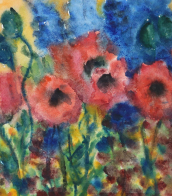

Hans Meid was a German painter, graphic artist and illustrator.
Meid attended an art and craft school in Karlsruhe, and then at the art academy he became a pupil of impressionist Wilhelm Trübner (1851-1917) and realist Walter Kontz (1872-1947). In 1907 the Meissen porcelain manufactory engaged him as a designer; in 1908 he settled in Berlin as a freelance artist. His success was recognized with the Villa Romana Prize (1910) and membership in the Berlin Secession (1911). In 1919 Meid became a lecturer in printmaking at the University of Fine Arts in Berlin. In 1927 he was elected a full member of the Prussian Academy of Fine Arts, where he also headed the graphic arts workshop.
In the first decades of the twentieth century Hans Meid, together with his close friend Max Slevogt, was one of the leaders of Impressionism. He created an extensive collection of etchings, lithographs and engravings, a large number of illustrations for works of world literature, including Cervantes' Don Quixote, Goethe's Selective Affinity and many others. He designed book covers for 44 publishers (notably Schünemann and S. Fischer). He later added ink drawing, watercolor and oil painting. In 1948 Hans Meid became a lecturer at the State Academy of Fine Arts in Stuttgart, he was also a member of the German Artists' Association.
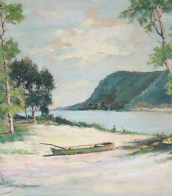

Hans Meid was a German painter, graphic artist and illustrator.
Meid attended an art and craft school in Karlsruhe, and then at the art academy he became a pupil of impressionist Wilhelm Trübner (1851-1917) and realist Walter Kontz (1872-1947). In 1907 the Meissen porcelain manufactory engaged him as a designer; in 1908 he settled in Berlin as a freelance artist. His success was recognized with the Villa Romana Prize (1910) and membership in the Berlin Secession (1911). In 1919 Meid became a lecturer in printmaking at the University of Fine Arts in Berlin. In 1927 he was elected a full member of the Prussian Academy of Fine Arts, where he also headed the graphic arts workshop.
In the first decades of the twentieth century Hans Meid, together with his close friend Max Slevogt, was one of the leaders of Impressionism. He created an extensive collection of etchings, lithographs and engravings, a large number of illustrations for works of world literature, including Cervantes' Don Quixote, Goethe's Selective Affinity and many others. He designed book covers for 44 publishers (notably Schünemann and S. Fischer). He later added ink drawing, watercolor and oil painting. In 1948 Hans Meid became a lecturer at the State Academy of Fine Arts in Stuttgart, he was also a member of the German Artists' Association.
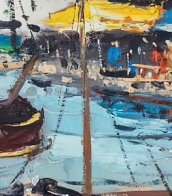

Hans Meid was a German painter, graphic artist and illustrator.
Meid attended an art and craft school in Karlsruhe, and then at the art academy he became a pupil of impressionist Wilhelm Trübner (1851-1917) and realist Walter Kontz (1872-1947). In 1907 the Meissen porcelain manufactory engaged him as a designer; in 1908 he settled in Berlin as a freelance artist. His success was recognized with the Villa Romana Prize (1910) and membership in the Berlin Secession (1911). In 1919 Meid became a lecturer in printmaking at the University of Fine Arts in Berlin. In 1927 he was elected a full member of the Prussian Academy of Fine Arts, where he also headed the graphic arts workshop.
In the first decades of the twentieth century Hans Meid, together with his close friend Max Slevogt, was one of the leaders of Impressionism. He created an extensive collection of etchings, lithographs and engravings, a large number of illustrations for works of world literature, including Cervantes' Don Quixote, Goethe's Selective Affinity and many others. He designed book covers for 44 publishers (notably Schünemann and S. Fischer). He later added ink drawing, watercolor and oil painting. In 1948 Hans Meid became a lecturer at the State Academy of Fine Arts in Stuttgart, he was also a member of the German Artists' Association.


Hans Meid was a German painter, graphic artist and illustrator.
Meid attended an art and craft school in Karlsruhe, and then at the art academy he became a pupil of impressionist Wilhelm Trübner (1851-1917) and realist Walter Kontz (1872-1947). In 1907 the Meissen porcelain manufactory engaged him as a designer; in 1908 he settled in Berlin as a freelance artist. His success was recognized with the Villa Romana Prize (1910) and membership in the Berlin Secession (1911). In 1919 Meid became a lecturer in printmaking at the University of Fine Arts in Berlin. In 1927 he was elected a full member of the Prussian Academy of Fine Arts, where he also headed the graphic arts workshop.
In the first decades of the twentieth century Hans Meid, together with his close friend Max Slevogt, was one of the leaders of Impressionism. He created an extensive collection of etchings, lithographs and engravings, a large number of illustrations for works of world literature, including Cervantes' Don Quixote, Goethe's Selective Affinity and many others. He designed book covers for 44 publishers (notably Schünemann and S. Fischer). He later added ink drawing, watercolor and oil painting. In 1948 Hans Meid became a lecturer at the State Academy of Fine Arts in Stuttgart, he was also a member of the German Artists' Association.
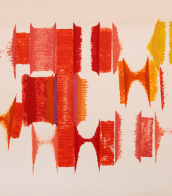

Hans Meid was a German painter, graphic artist and illustrator.
Meid attended an art and craft school in Karlsruhe, and then at the art academy he became a pupil of impressionist Wilhelm Trübner (1851-1917) and realist Walter Kontz (1872-1947). In 1907 the Meissen porcelain manufactory engaged him as a designer; in 1908 he settled in Berlin as a freelance artist. His success was recognized with the Villa Romana Prize (1910) and membership in the Berlin Secession (1911). In 1919 Meid became a lecturer in printmaking at the University of Fine Arts in Berlin. In 1927 he was elected a full member of the Prussian Academy of Fine Arts, where he also headed the graphic arts workshop.
In the first decades of the twentieth century Hans Meid, together with his close friend Max Slevogt, was one of the leaders of Impressionism. He created an extensive collection of etchings, lithographs and engravings, a large number of illustrations for works of world literature, including Cervantes' Don Quixote, Goethe's Selective Affinity and many others. He designed book covers for 44 publishers (notably Schünemann and S. Fischer). He later added ink drawing, watercolor and oil painting. In 1948 Hans Meid became a lecturer at the State Academy of Fine Arts in Stuttgart, he was also a member of the German Artists' Association.


Hans Meid was a German painter, graphic artist and illustrator.
Meid attended an art and craft school in Karlsruhe, and then at the art academy he became a pupil of impressionist Wilhelm Trübner (1851-1917) and realist Walter Kontz (1872-1947). In 1907 the Meissen porcelain manufactory engaged him as a designer; in 1908 he settled in Berlin as a freelance artist. His success was recognized with the Villa Romana Prize (1910) and membership in the Berlin Secession (1911). In 1919 Meid became a lecturer in printmaking at the University of Fine Arts in Berlin. In 1927 he was elected a full member of the Prussian Academy of Fine Arts, where he also headed the graphic arts workshop.
In the first decades of the twentieth century Hans Meid, together with his close friend Max Slevogt, was one of the leaders of Impressionism. He created an extensive collection of etchings, lithographs and engravings, a large number of illustrations for works of world literature, including Cervantes' Don Quixote, Goethe's Selective Affinity and many others. He designed book covers for 44 publishers (notably Schünemann and S. Fischer). He later added ink drawing, watercolor and oil painting. In 1948 Hans Meid became a lecturer at the State Academy of Fine Arts in Stuttgart, he was also a member of the German Artists' Association.
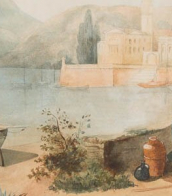

Hans Meid was a German painter, graphic artist and illustrator.
Meid attended an art and craft school in Karlsruhe, and then at the art academy he became a pupil of impressionist Wilhelm Trübner (1851-1917) and realist Walter Kontz (1872-1947). In 1907 the Meissen porcelain manufactory engaged him as a designer; in 1908 he settled in Berlin as a freelance artist. His success was recognized with the Villa Romana Prize (1910) and membership in the Berlin Secession (1911). In 1919 Meid became a lecturer in printmaking at the University of Fine Arts in Berlin. In 1927 he was elected a full member of the Prussian Academy of Fine Arts, where he also headed the graphic arts workshop.
In the first decades of the twentieth century Hans Meid, together with his close friend Max Slevogt, was one of the leaders of Impressionism. He created an extensive collection of etchings, lithographs and engravings, a large number of illustrations for works of world literature, including Cervantes' Don Quixote, Goethe's Selective Affinity and many others. He designed book covers for 44 publishers (notably Schünemann and S. Fischer). He later added ink drawing, watercolor and oil painting. In 1948 Hans Meid became a lecturer at the State Academy of Fine Arts in Stuttgart, he was also a member of the German Artists' Association.
